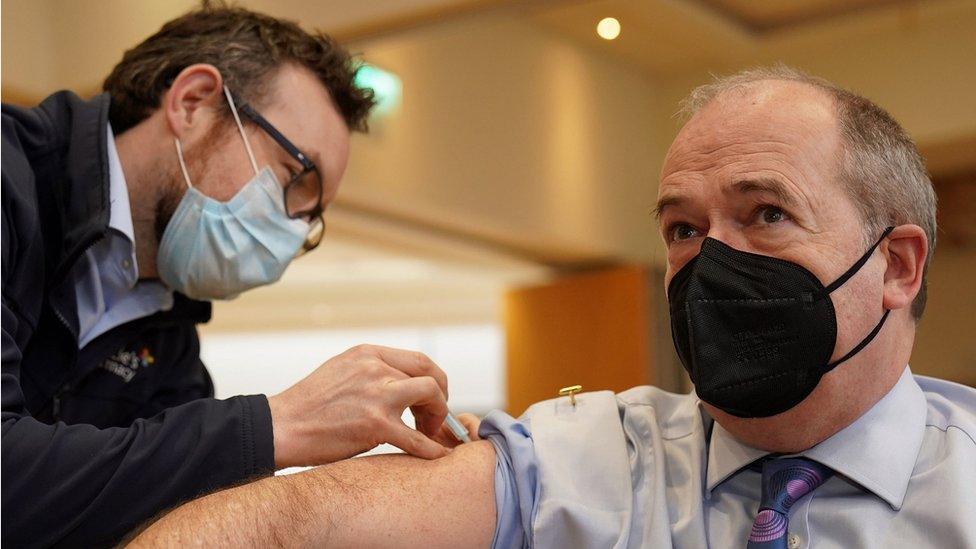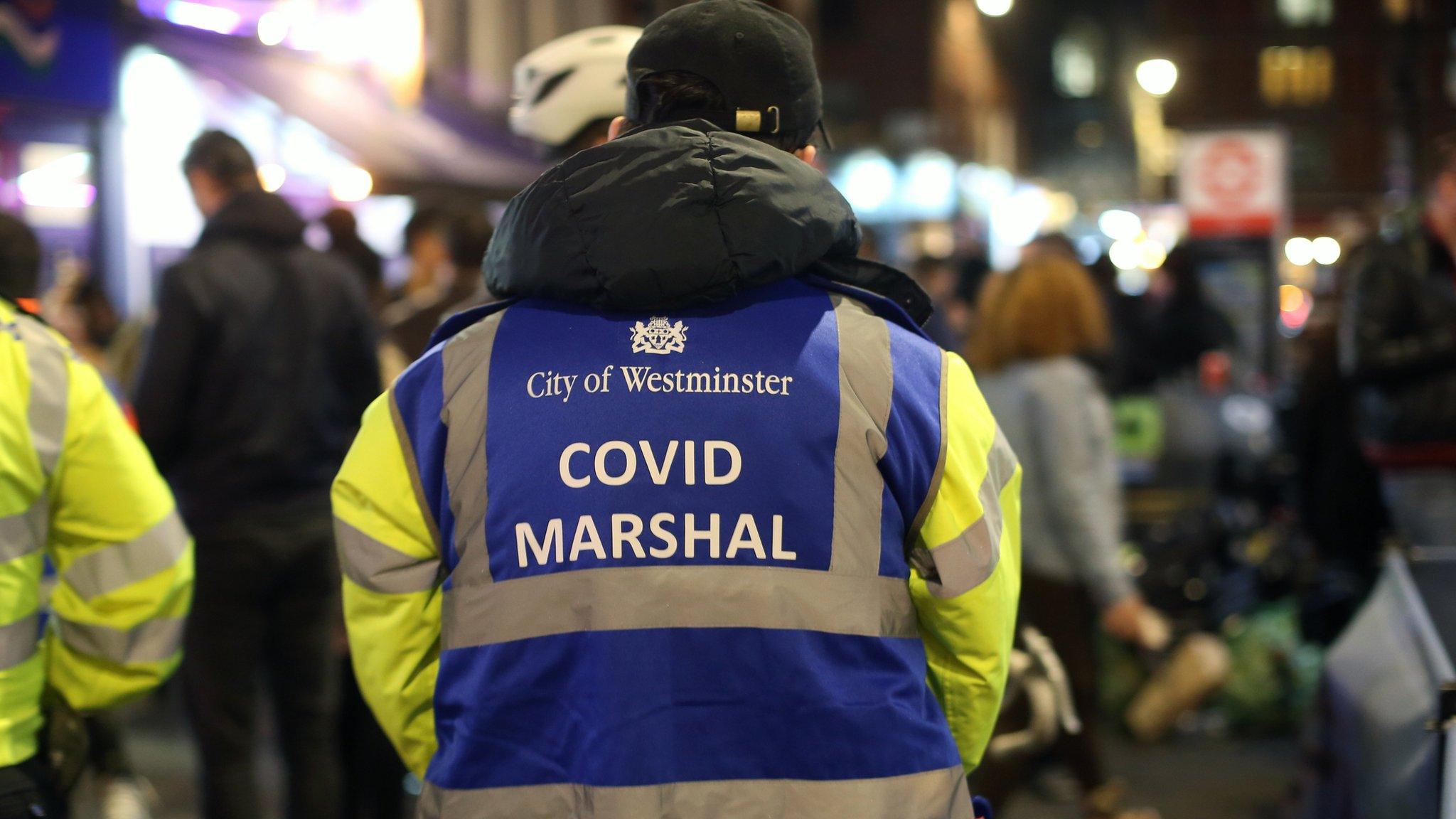Covid-19: Omicron variant may already be in NI, says Robin Swann
- Published
- comments
Covid-19: 'This is not a time for either panic or despair'
The new Omicron Covid-19 variant may already be in Northern Ireland, Health Minister Robin Swann has told the assembly.
There are concerns, expressed by the World Health Organization, external, that the new variant has a higher re-infection risk.
A number of cases have already been detected in both England and Scotland.
Mr Swann told assembly members on Monday that so far no cases of the variant had been identified in Northern Ireland.
"But it is highly likely that this position will change in the coming days," he said.
"In light of the cases identified in England and Scotland, it is to be expected that there may already be cases of the variant in Northern Ireland."
The minister said the Public Health Agency (PHA) had established a regional incident management team, which was liaising closely with its UK-wide equivalent, as well as authorities in the Republic of Ireland.
Mr Swann said the new variant was a "serious and concerning development which has the potential to act as a further shock to our health and social care system".
He said it was inevitable that there would be cases in Northern Ireland and essential that preventive measures were now taken.
However, he added that it was "not a time for panic or despair".
Northern Ireland recorded a further four coronavirus-linked deaths and 1,464 new cases on Monday.
Travel restrictions
Mr Swann announced a tightening of restrictions for international travellers arriving in Northern Ireland. The travel restrictions do not apply to those travelling within the Common Travel Area (CTA).
From 04:00 GMT on Tuesday, anyone arriving into Northern Ireland from non-red list countries, who is fully vaccinated, will now be required to self-isolate and take a PCR test before the end of day two, external. If the PCR test is negative, they can leave self-isolation.
Travellers from non-red list countries who are not fully vaccinated must self isolate for 10 days and and take a PCR test on or before day two and on or after day eight. They cannot leave self-isolation until their 10 day period is up and only then if the day eight test is negative.

A number of Omicron cases have already been detected in both England and Scotland.
Mr Swann told the assembly that the situation would be reviewed in three weeks, as more details on the Omicron variant emerge.
'Encourage vaccination'
The health minister said said while the variant may reduce the effectiveness of the current vaccines "it remains very likely that vaccination will continue to protect against severe illness from Omicron as it does against other variants".
"This means that it is critical that we continue and indeed accelerate our vaccination programme to ensure that as many people as possible avail of this essential protection," he added.
"I appeal to everyone in this house - everyone - to support and encourage vaccination by word and by deed. That is the responsible thing to do.
"Let us not be bullied or distracted by the tiny minatory of anti-vaxxers and their fellow travellers."
'Pandemics come to an end'
Speaking after Mr Swann's assembly statement, chief medical officer Dr Michael McBride said it was better to act on a precautionary basis "until we learn more about this variant of concern".
However, he added: "All pandemics come to an end and this one will too, this virus will continue to mutate and change.
"Now is the time, yes, for concern and for caution, but absolutely we have made huge strides forward as a result of the contribution of science, the development of vaccines and treatments and we all know the steps and interventions that work, the things that we can do on a day and daily basis to reduce the risk of us transmitting this virus to each other.
"So let's redouble our efforts and let's get through this."

Dr Michael McBride, seen here getting his Covid booster, said as with all pandemics this one will come to an end
He added: "We have the capacity to modify the current vaccines if indeed that becomes apparent with the Omicron variant [that it can evade current vaccines]."
It also said the minimum gap between the second dose and booster should also be reduced to three months.
Meanwhile, in the Republic of Ireland 11 positive Covid-19 tests are being further examined to see if they are the Omicron variant.
Omicron was first reported from South Africa on 24 November.
Quarantine measures were previously introduced across the UK for travellers arriving from affected countries.
South Africa, Botswana, Namibia, Zimbabwe, Lesotho and Eswatini were added to the red list.
Flights from those countries were suspended in the UK from 12:00 GMT on Saturday.
Dr Frances O'Hagan, deputy chair of the GP committee of the British Medical Association (BMA) in Northern Ireland, said it was inevitable that a positive case of the new variant will be found in Northern Ireland.
"It has turned up in England, it's turned up in Scotland and you would have to think that it's only a matter of time before it turns up here," she told BBC Radio Foyle.
"We just have to try and reduce the spread the best we can."
The Armagh-based GP said it was imperative that people, now more than ever, "remember the basics".
"I have said this so many times but people need to remember to wash their hands, keep your face mask on and try and keep your distant as much as possible," she added.
"If we are sensible about these measures we can try and ensure that we don't end up in a position where we have further lockdowns because that doesn't help anyone.
"It's all about being smart here and doing the right thing. We have to be smart here."
Related topics
- Published6 December 2021
- Published28 November 2021
